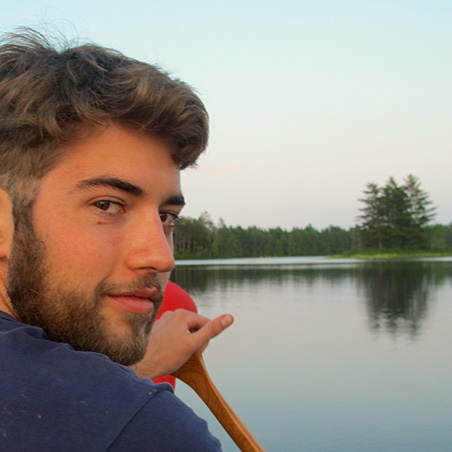Angus Morgan
Family Medicine Resident at University of British Columbia
Bachelor of Science, Biology, 2013
Being open minded is something I carry with me from King’s.
Growing up, Angus Morgan had always been interested in the sciences. But he hadn’t considered going to King’s until a couple of mentors, friends a few years older than he, gave him some advice.
“They said – ‘you can come to King’s like we did and get an interesting foundation in both the arts and science and go on to study just science after that.’ I’m happy I did that and that I can pass that advice on. It made a big difference for me.”
Indeed. It has helped him immeasurably in his chosen career.
Angus started with FYP (Foundation Year Program) Science and continued in the History of—Science and Technology program (HOST) pairing it with biology for a combined degree. That set him up for medical school, a frightening but exciting prospect he says. His time at King’s though, gave him an advantage.
“I remember when I was applying to medical school, it felt as though there were very few students there who have studied the humanities, and I still believe it helped to distinguish myself from the other applicants. Since then, I know my experience at King’s has shaped my perspective when tackling clinical and ethical situations at every turn within medicine.
Angus says the lessons he learned fit a burgeoning physician like a surgical glove.
“Critical thinking, compassion, the human connection—which relies so heavily on communication—these are such critical parts of both the science and the art of medicine. King’s really helped prepare me for that.”
Angus offers another observation about how King’s has prepared him for a life in medicine. It’s not one that immediately comes to mind.
“King’s is a very inclusive environment. I left King’s far more open-minded than when I arrived— I will always be thankful to King’s for that. It’s a very progressive space.”
Angus says learning to strive to be non-judgmental, in all things, is a lesson that will serve him, and his patients, well. “If you can carry that into a career as a physician, it’s worth its weight in gold.”
“There is one patient I often think about who I got to know over weeks of treatment for addiction. Some see addiction as a moral failing rather than a disease. When you get to know people, like this patient, you start to understand that people don’t just fall into addiction because they want to, or it makes them happy. So often they have suffered abuse, sexual or physical as a child, or some other trauma. As a physician, how can I pass judgment on them?”
In the summer of 2018 Angus began a two-year residency in family medicine in rural British Columbia. He chose family medicine because as he says, “I love variety within a workday. Family medicine allows for that in spades.”
“It’s an interesting phenomenon,” says Angus. “You learn much more about a disease by treating people who have it than by just reading about it. You learn so much from your patients-not just about medicine, but also so much about life.”
Posted: September 2018
